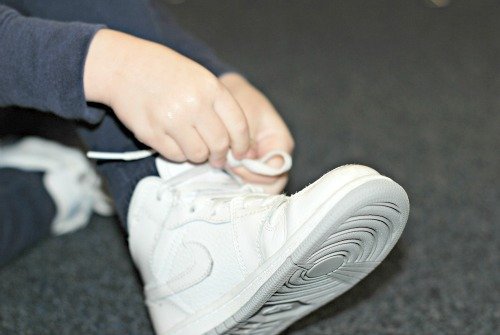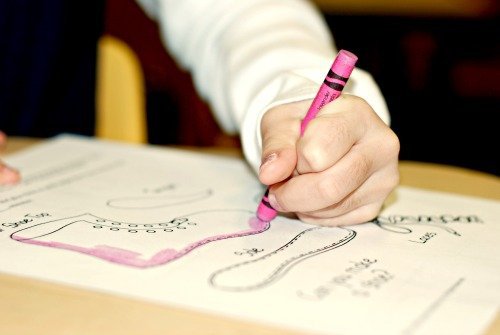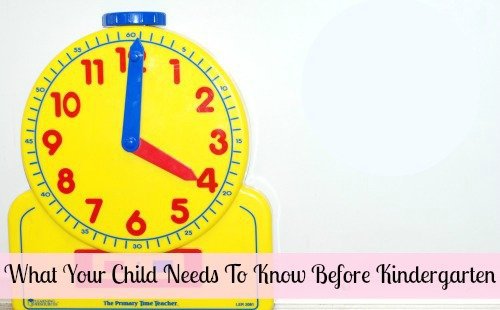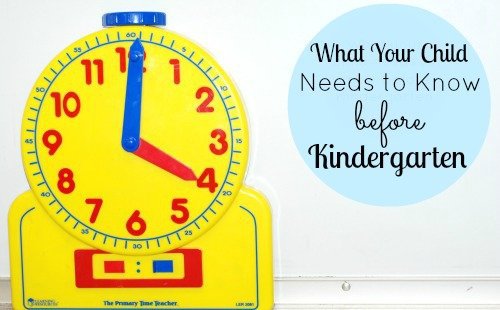Photo Credit: Hinge Photography
You may be wondering where the time has gone and how it is possible that your sweet baby is going to be attending school soon.
Does he know everything he needs to know before that emotional first day? Have you properly prepared her for the things she will encounter when she walks through that door? You may even be worried about how you will make it through that first day! Luckily, Daily Mom has done your homework for you. We have collected insight from kindergarten teachers of public, private and Montessori schools from across the country about what your child will be expected to know. Here is a list of concepts and skills that your child needs to grasp before beginning kindergarten.
 Photo Credit: Hinge Photography
Photo Credit: Hinge Photography
Personal
- Covering sneezes and blowing his nose
- Using and flushing the toilet on her own
- Washing her hands
- Tying his shoes
- Dressing and fastening his own clothes
- Using silverware properly
- Knowledge of her name, address, and phone number
Literacy
- Must be able to identify each letter of the alphabet, out of order
- Knows the sounds that each letter makes
- Is able to follow multi-step directions
- Uses lower case letters – only using uppercase when necessary
- Is able to rhyme words
- Can put pictures in a logical, sequential order
- Can sound out CVC words (cat, gab, pan)
- Recognizes signs from his environment
 Photo Credit: Hinge Photography
Photo Credit: Hinge Photography
Social
- Follows through with a task to completion but asks for help if needed
- Interacts well in group situations – contributes without dominating
- Follows rules and sets a good example
- Cooperates with routines and transitions (does not lose self-control when beginning a new task)
- Uses his words to resolve a conflict with a peer – does not resort to tattling or hitting
Mathematical
- Is able to sort colors, sizes and shapes
- Can complete a simple pattern
- Understands positional and directional concepts (right/left, under/above, front/back)
- Can count to 20 and identify numerals out of order
- Knows the names for basic shapes: oval, square, circle, triangle, rectangle, heart and diamond
- Identifies coins and their values
 Photo Credit: Hinge Photography
Photo Credit: Hinge Photography
Physical
- Holds pencil with a strong, steady grip
- Is able to write her own name: first and last
- Holds scissors correctly and demonstrates that he can cut out patterns on the lines
- Uses moderation when dispensing glue, soap, or paint
- Demonstrates caution and safety – aware of potential dangers
While these are recommendations from teachers on ways to prepare your child for kindergarten, it is not a checklist of accomplishments that your child must complete before the very first day of school. Each child is unique and no teacher would intend to make all children fit the same mold. This information is for aiding parents who want to give their child the best head start possible before they begin school.










































Being a preschool teacher, I love this!
Huh. Interesting. As someone with an Early Childhood Education background, and with a mother who taught kindergarten (at a private school) for 26 years and now is a professor at a private university teaching ECE to future teachers (with a Master’s and going for her PhD in early childhood education), this list really surprises me. Many of these things are activities that are worked on during the school year, not skills that children should know going INTO kindergarten. Specifically things like writing their first AND last name, holding scissors and cutting more than simple shapes/lines, identifying all the numbers and letters, knowing the sounds for all the letters, sounding out simple words, and using lowercase letters (or uppercase appropriately) are things that particularly advanced children may know (usually 1 or 2 of them; rarely all of them) but that the average child learns during the school year. It’s good for parents to work TOWARDS those things with their children, but saying that kindergarten teachers want or expect your child to have these skills isn’t quite accurate.
Lara, thank you for your comment.
We are certainly not saying that each student has to meet this comprehensive list. That’s why we included the disclaimers. We want to give moms the most information possible, though, so that they may make their own, informed decisions.
You can certainly agree that mastering some or many of these skills before kindergarten will give children a head start, like we mentioned in the article.
As a retired kindergarten teacher who has taught in one of the best schools in NY with very high performing students, I find many flaws with this list. Some skills such as personal and social on this list are good, but I agree with Lara that almost all of the other skills are worked on during the school year. Yes, there are the children who do come in knowing those skills. Why? Precisely because of lists like this one that tells parents what to do before their child is DEVELOPMENTALLY ready. Look at that photo of the child holding his or her pencil for instance. I cringe when I see it because that is the incorrect way of holding a pencil. Can the child write, sure. But the thumb being on top of the other fingers make it a GROSS motor, not fine motor skill. It is evident in children who have not developed their physical skills and are still struggling with fine motor skills. Memorizing the alphabet and knowing the sounds have very little with “reading”. Decoding skills are often mistaken for being able to “read”, but reading include comprehension. I could go on and on, but I really hope parents who read lists like these will take them with a grain of salt. You will be the best judge of where your child is. Read to your child everyday. Talk about going to school. Make school fun and important. Your child’s excitement for learning and your willingness to be involved is the #1 indicator of success.